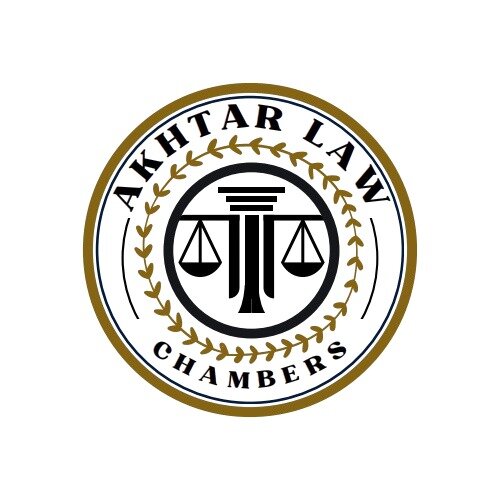Best Admiralty & Maritime Lawyers in Pakistan
Share your needs with us, get contacted by law firms.
Free. Takes 2 min.
Or refine your search by selecting a city:
List of the best lawyers in Pakistan
About Admiralty & Maritime Law in Pakistan
Admiralty and Maritime Law in Pakistan governs legal issues associated with nautical matters including shipping, navigation, waters, and commerce occurring over water bodies within or adjacent to the country. Given Pakistan's extensive coastline along the Arabian Sea, its bustling ports such as Karachi and Gwadar play crucial roles in the economic framework, necessitating a robust maritime legal system. This area of law pertains to both domestic and international regulations and enforces laws regarding marine-based commerce and navigation, marine insurance, injuries sustained at sea, salvage operations, and environmental concerns related to maritime activities.
Why You May Need a Lawyer
Individuals or entities may require a lawyer in Admiralty & Maritime situations for a variety of reasons, including:
- Disputes arising from maritime contracts related to shipping or transportation of goods.
- Injury claims following accidents at sea involving crew members, passengers, or third parties.
- Ownership conflicts and registration issues concerning maritime vessels.
- Legal challenges related to marine insurance claims.
- Environment-related violations and disputes concerning pollution or maritime environmental harm.
- Incidents involving piracy or unlawful activities at sea.
- Arbitration or mediation processes for resolving maritime disputes outside of court.
Local Laws Overview
Pakistan's Maritime laws are influenced by both domestic legislations and international conventions to which Pakistan is a signatory. Some key aspects include:
- Merchant Shipping Ordinance 2001: A comprehensive statute regulating ship registration, safety protocols, maritime labor, and other commercial activities involving ships.
- Carriage of Goods by Sea Act 1925: This Act governs the responsibilities and liabilities of those involved in the transportation of goods by sea.
- The Pakistan Maritime Security Agency Act 1994: Defines the roles and responsibilities of the Maritime Security Agency, including safeguarding Pakistan's maritime interests.
- Ports Act 1908: Regulates port activities and administration to ensure efficient and safe operation.
- Environmental Protection Act 1997: Contains provisions concerning the protection and management of the marine environment.
Frequently Asked Questions
What is Admiralty & Maritime Law?
This branch of law deals with legal matters related to maritime activities, including shipping, navigation, waters, and associated commerce. It also encompasses laws concerning marine resources and the personnel involved in maritime activities.
Who governs maritime laws in Pakistan?
Maritime laws in Pakistan are governed by a combination of domestic legislations such as the Merchant Shipping Ordinance 2001, Carriage of Goods by Sea Act 1925, as well as international maritime conventions.
How can I resolve a dispute related to a shipping contract?
A maritime lawyer can guide you through negotiation, arbitration, or court proceedings depending on the nature of the dispute and the terms of the contract.
What should I do if I suffer an injury on a vessel?
Seek immediate medical attention and report the incident to the appropriate authorities. Consulting a maritime lawyer is essential to understand and pursue any legal rights or claims you may have.
Are there special considerations for registering a maritime vessel in Pakistan?
Yes, vessel registration is governed by the Merchant Shipping Ordinance 2001, which outlines specific requirements that must be complied with for proper registration.
Can maritime disputes be settled outside of court?
Yes, many maritime disputes can be handled through arbitration or mediation, which are less formal methods of dispute resolution compared to court proceedings.
How do I handle marine pollution allegations?
Contact a lawyer experienced in maritime and environmental law to explore your options and defense strategies, especially in terms of compliance with the Environmental Protection Act 1997.
What is salvage law?
Salvage law deals with compensation for rewarding those who aid in the recovery of a ship or its cargo from peril at sea. Legal aspects of salvage operations are varied and can involve complex claims.
Are piracy incidents common and how are they dealt with legally?
While piracy is a well-known threat in international waters, the Pakistan Maritime Security Agency deals with such incidents. Prosecuting piracy involves international laws and cooperation.
What's the best way to protect my maritime investments legally?
Engage with qualified maritime lawyers to tailor contracts, insurance policies, and compliance programs specific to maritime operations to safeguard your interests.
Additional Resources
Individuals seeking additional information or resources related to Admiralty & Maritime Law in Pakistan may find these organizations helpful:
- Pakistan Maritime Security Agency: Central body responsible for enforcing maritime law and ensuring safety and security at sea.
- Director General Ports & Shipping: Overseeing the compliance and regulatory framework of port and shipping operations within Pakistan.
- Karachi Port Trust (KPT): Manages and operates the port activities at Karachi, providing essential resources for maritime commerce.
- International Maritime Organization (IMO): Specialized UN agency responsible for ensuring the safety and security of shipping and the prevention of marine pollution.
Next Steps
If you find yourself needing legal assistance in Admiralty & Maritime matters in Pakistan, consider the following steps:
- Determine the specific nature of your legal issue to identify the type of legal advice you require.
- Consult with a lawyer(s) who specializes in Admiralty & Maritime Law, ensuring they have relevant experience and understanding of both local and international laws.
- Prepare all necessary documents and details related to your problem for a more efficient consultation and resolution process.
- Explore different resolution options, including mediation, arbitration, or direct settlement, with the guidance of your legal advisor.
Lawzana helps you find the best lawyers and law firms in Pakistan through a curated and pre-screened list of qualified legal professionals. Our platform offers rankings and detailed profiles of attorneys and law firms, allowing you to compare based on practice areas, including Admiralty & Maritime, experience, and client feedback.
Each profile includes a description of the firm's areas of practice, client reviews, team members and partners, year of establishment, spoken languages, office locations, contact information, social media presence, and any published articles or resources. Most firms on our platform speak English and are experienced in both local and international legal matters.
Get a quote from top-rated law firms in Pakistan — quickly, securely, and without unnecessary hassle.
Disclaimer:
The information provided on this page is for general informational purposes only and does not constitute legal advice. While we strive to ensure the accuracy and relevance of the content, legal information may change over time, and interpretations of the law can vary. You should always consult with a qualified legal professional for advice specific to your situation.
We disclaim all liability for actions taken or not taken based on the content of this page. If you believe any information is incorrect or outdated, please contact us, and we will review and update it where appropriate.
Browse admiralty & maritime law firms by city in Pakistan
Refine your search by selecting a city.

















